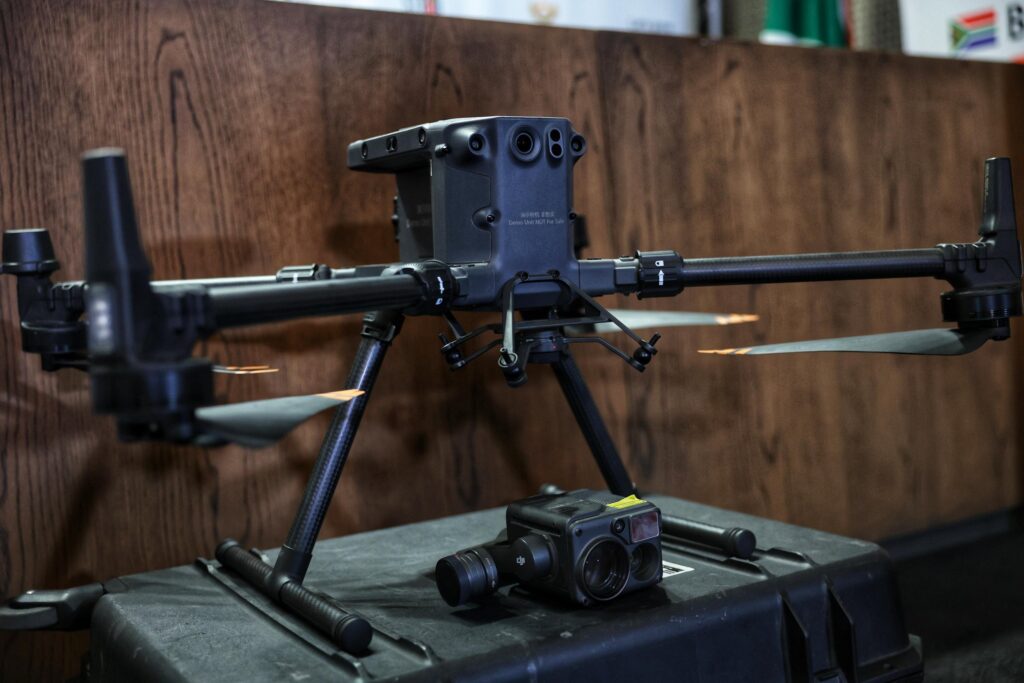South Africa’s Border Management Authority has launched a new high-tech initiative aimed to tightening border security and curbing illicit trade that costs the country millions of dollars each year.
Home Affairs Minister Leon Schreiber recently announced the new security push, which includes using four quadcopter-style drones to monitor ports of entry and areas of the border known for illegal crossings.
The drones can operate day and night. Their cameras can track targets 2 kilometers away and infrared cameras can detect the heat signatures of people crossing at night. Artificial intelligence (AI) helps identify and track objects. A laser rangefinder calculates a target’s distance and pinpoints its location.
“This is a revolution in border management,” Schreiber said during a media briefing ahead of the April 15 launch of the program. “These drones launch within 15 seconds. If there is any indication that they are required or that there is a disturbance, they will be in the air immediately.”
The technology package also includes 40 body cameras for border agents. The cameras record interactions with suspected illegal border crossers and provide a way to locate and rescue agents if they encounter trouble. The goal of the new technology is to reduce illegal crossings along South Africa’s porous 4,470-kilometer land border and the illicit trade that comes with them. South Africa shares a border with Botswana, Eswatini, Lesotho, Mozambique, Namibia and Zimbabwe.
According to the Transnational Alliance to Combat Illicit Trade, South Africa ranks fourth on the continent for cross-border smuggling of goods and materials behind Tunisia, Mauritius and Morocco.
Alliance researchers praised South African officials for boosting spending on border security and expanding interagency cooperation but noted that “progress remains uneven and difficult to sustain.”
“Illicit trade is not merely a criminal or enforcement issue — it is a systemic threat with far-reaching economic, fiscal, and governance implications,” they added.
South Africa’s illicit trade involves millions of dollars in alcohol, tobacco, food, pharmaceuticals, agricultural chemicals, counterfeit goods, mining and wildlife trafficking. Illicit alcohol and tobacco alone account for $1.6 billion annually, or about a third of the overall illegal trade.
By some estimates, illicit cross-border trade is equal to 10% of South Africa’s gross domestic product.
“If you were to engage with the people in the tobacco industry in the country, they will tell you about how the illicit tobacco is in a way deactivating their legal businesses,” border authority Commissioner Michael Masiapato recently told Newzroom Afrika. “So, this is a very serious matter.”
The government used the Easter holiday period, which is a time when border crossings spike, to put the new system into service.
Along with spotting illegal border crossers, the drones will be used to identify and arrest taxi drivers and other individuals who facilitate the illegal crossings, Masiapato said. Drones help border agents pinpoint the location of illegal crossings as they happen.
“Then it becomes a targeted activity through which they will be able to go directly to where those individuals are entering the country illegally and intercept them,” he added.
The border authority tested the concept of using drones in security during another high-traffic period at the end of 2024. Masiapato said that his agency intercepted 58,000 people illegally crossing the border during that time.
Officials conducted that trial using drones belonging to the Ministry of Agriculture. Under the new program, the Ministry of Agriculture will share its five drones with the authority as needed.
Masiapato said the addition of drone technology will help the authority improve border security despite budget and personnel shortfalls.
“The financial challenges that we have in the law enforcement space is very much problematic,” Masiapato told Newzroom Afrika. “And that is why the vulnerability continues.”

